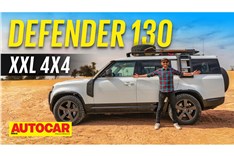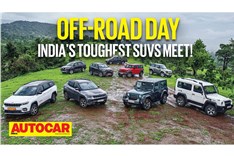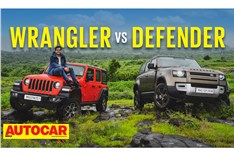Land Rover Defender vs Mercedes G Class vs Jeep Wranger comparison
With legacies forged in war and badges as powerful as the vehicles they’re fitted to, we finally bring together the three icons of off-roading.
Published on Nov 30, 2024 08:30:00 AM
22,489 Views
Follow us on

Defender has the best on-road performance by miles.

Rear camera peeks out of spare wheel compass cover.

Stunning quality, many options in the Merc’s cabin.
Everything just has to be some form of SUV these days, right? And you know what – that’s just fine. If you want a sedan with lifted suspension, a curvy roof and a punchier engine, do it! It’s adding more sport to your life. If you want a lifted hatchback with boxy sides and a bit of cladding, go for it – it gives you greater utility. That’s S and U covered.
However, if you’re an alumnus of the Old School – the type who believes that an SUV must have four-wheel drive, high ground clearance and tough underpinnings, that it must be able to climb mountains, ford streams and have ancestors that fought in actual wars – there are only a handful of SUVs on the planet that would fit the bill. And after years of trying, we finally have three of them together on the same loose clump of mud.
.jpg&c=0&w=700)
The Jeep Wrangler, Land Rover Defender and Mercedes G-Class are not rivals in the truest sense of the word. How could they be, with prices of Rs 72 lakh, Rs 1 crore, and Rs 2.5 crore, respectively? What they are, though, are the modern descendants of three of the most iconic 4x4s in history and are themselves pretty iconic in their own right.
So, while we will compare how they perform on and off the road and what creature comforts each of them provides, we’re also going to see what makes each of them unique.
Defender vs G Class vs Wrangler off-roading
What better place for these three to start proving themselves than in the rough? Though each is good enough to be a benchmark for mud plugging, as proven in our Off-Road Day group test a couple of months ago, each also goes about it very differently.
To this end, the Wrangler is the most focused on the task at hand; particularly in Rubicon guise, it is the most outright capable off-roader in the bunch. A lot of that is down to its standard mud-terrain (M/T) tyres that sink their sipes into the loosest of surfaces to pull the Jeep out of places lesser SUVs would need a winch for. Then there are the disconnecting sway bars that turn it from a rhino to a rock crab, giving it articulation that no stock SUV on the planet can match. There is some electronic assistance, too, including the ability to choose your hill descent speed, but the Wrangler experience is a largely mechanical and analogue one. As you’ll see later, you pay the price for this on the road, but to buy purely as an off-roader, the Rubicon is the way to go.
.jpg&c=0&w=700)
At the very opposite extreme is the Defender, which almost feels too nice to take off-road. It’s the furthest removed from its utilitarian forebear, ditching the tough ladder-frame chassis and rigid suspension for a monocoque and air springs. Instead of levers and knobs, you engage the hardware with light taps of a button or via the touchscreen. The locking diffs, ride height and traction control are managed by computer and drive modes, and such a level of autonomy in off-roading can be daunting at first. Once you get used to it, it’s remarkably capable, though perhaps not to the unstoppable level the Wrangler is. The electronics can often take a moment to figure things out, but once the algorithm deploys, it takes the effort out of off-roading. It truly is plush through the mush, though for off-roading enthusiasts, it could be a bit anticlimactic.
.jpg&c=0&w=700)
There’s nothing anticlimactic about the G-Wagen, which is an occasion on four wheels. There’s a weighty, mechanical invincibility to the way it off-roads that sets it apart from the others. Having the most powerful engine here – a 3.0-litre diesel with 700Nm – certainly helps, and you get the sense it can just muscle its way out of a tricky situation. You rarely have to lock any more than the centre differential – done via the now-iconic three switches on the dash – but if you lock all three, it will twist the very Earth beneath you. It can feel a bit top-heavy (and heavy in general) through some hairier obstacles, but chances are you will give up a lot sooner than it will.
.jpg&c=0&w=700)
Defender vs G Class vs Wrangler on-road manners
Let’s face it, though. Any of these cars will be used more on the tarmac than off it, but even if you’re buying one of these to only go off-roading, you still have to get to the mud via the road. And while they’re all pretty incredible in the muck, out on the road, it’s a different story.
It takes a certain amount of commitment to choose a Wrangler and even more so to choose the Rubicon, which, despite its best efforts at modernity in 2024, feels the most compromised on the road. At any given time, there are at least three different rattles in the cabin, the footwell is tiny with no dead pedal, and wind (and sometimes water) enters via gaps in the bodywork. And all that’s before you get to the M/T tyres and rigid-axle suspension, which together make for a less-than-pleasant on-road experience. Tyre roar is ever present, getting worse the faster you go, and the ride quality is lumpy at best and crashy at worst. That aside, you’ll have little to complain about when it comes to the powertrain, which, though a little boomy, feels strong enough for this car. Another big surprise is the steering, which feels light and affords the Jeep impressive manoeuvrability.
.jpg&c=0&w=700)
It’s not a surprise that the Defender is the best-behaved on the road. Its platform, after all, is based on the previous Range Rover’s, and with cushy adaptive air suspension, it rides like a dream. It’s also worth pointing out that it gives you the most choice – three body lengths, six seating configurations and five engines. This 300hp, 2.0-litre petrol is the smallest, though it doesn’t feel inadequate; you can also have a diesel or even a 635hp V8, with a corresponding increase in price, of course. It’s the best handling, too, with progressive steering and decent body control, especially if you put it in its Dynamic mode. It’s no sports SUV, but its monocoque setup makes it far more agreeable going fast around corners than the other two.

Once again, the G-Wagen falls neatly between the other two. Yet, it is a force to be reckoned with, stronger than either of them. Though it has a ladder-frame chassis, it’s not as fidgety as the Wrangler but also nowhere as smooth as the Defender (or any other Mercedes SUV, for that matter). It doesn’t so much ride over bumps and potholes as it forces them to bend to its will. The seating position feels the tallest and most upright, perfect for lording over lesser vehicles. Its straight-six diesel is surprisingly smooth and easily the strongest, and yes, there’s the 585hp V8 AMG should you want more poke still. There are drive modes to unlock a bit more responsiveness, though they make little difference to the ride. No, it’s not a handler, though it has to be said it feels very stable at high speeds, almost as much as the air-sprung Defender.
Defender vs G Class vs Wrangler design, interior and features
To a layperson, the G-Wagen may as well be the same one that debuted in the late 1970s; such is its devotion to its original look. The truth is, this is an all-new generation that debuted in 2018, which, though still quite traditional under the skin, has seen the benefit of some modern tech. This includes Mercedes’ dual-screen infotainment system, although not the newest MBUX software and not even a touchscreen – these will come with a facelift next year. Quality and craftsmanship, however, are where you feel your money’s been spent, with lashings of contrast-stitched leather, metallic trim and carbon-fibre inserts – though I suspect some of these are optional extras; go figure. The Adventure Edition does add a bit of visual drama with mud flaps, a roof rack and a ladder, but even without this, the G has a uniquely towering presence.
.jpg&c=0&w=700)
The other two aren’t far behind, mind you, and the Defender, especially – with its different body styles and exterior specifications – likes to let everyone know you’ve arrived. Yes, it looks a little like the original, but modern renditions of the original’s signature motifs – round headlamps, small tail-lamps and the roof-mounted ‘safari windows’ – are nice retro callbacks. On the inside, quality might be a little shy of the Mercedes, especially some of the plasticky switchgear, but it’s still ‘luxury-car’ good. And like on the outside, it does a modern interpretation of the classic cabin and offers loads of practical storage. It’s big on tech, too, with the latest Pivi Pro touchscreen being particularly slick to use, but they’ve helpfully kept some physical buttons in to make things easier to operate in the rough.
.jpg&c=0&w=700)
Despite debuting a slick new 12.3-inch touchscreen, the Jeep has plenty of physical controls, too. In fact, it has a fun, almost toy-like dashboard layout that makes the other two look staid in comparison. There are lashings of red trim, fun iconography and plenty of Easter eggs littered around the cabin, and it suits its ‘off-road plaything’ personality well. Quality is still rather good, actually, and there’s even ADAS and a nice sound system, despite the fact that the doors and roof can be removed entirely. As a result, yes, they don’t shut (or shut the world out) in the same way the sophisticated Defender or vault-like G-Class do, but it’s all part of this SUV’s recreational nature.
.jpg&c=0&w=700)
They all have large boots that can easily swallow up a couple of drinks coolers and weekend bags, with the Defender 110 getting an optional pair of small third-row jump seats that fold away. Of course, you can opt for the 90 or 130 versions if you want a more compact SUV or more seating space, respectively. Speaking of, the Defender’s second-row seats are the best, with the most space and the best comfort. The Mercedes feels comfy enough but too upright, while the Jeep seat feels low to the ground with not enough padding or support.
Defender vs G Class vs Wrangler verdict
They’re not rivals, so we don’t have to pick a winner, right? Well, yes and no. While their prices aim them at different buyers, there could be some overlap – perhaps if you could afford them all. They are united by their all-conquering abilities off-road, and each has a presence and desirability that would make anyone proud to park them in their driveway.
But, since each has carved out its own rut, let’s see which one’s best at what. The Jeep makes some compromises to comfort in its quest to be the ultimate off-roader, and though there is a more user-friendly ‘Unlimited’ version, if you’re getting a Wrangler, it’s really the tough-as-nails Rubicon that you want. Thanks to local assembly, it comes at a (relatively) reasonable price, and for that, you get the greatest stock 4x4 in the world! How about that?
.jpg&c=0&w=700)
The Gentleman’s Express that is the Land Rover Defender is more concerned that your tea doesn’t spill as you’re cresting that rock face. It’s determined to make off-roading as comfy and effortless as possible, and to that end, it feels more like it was designed to save you from a sticky situation rather than go out in pursuit of one, as the Wrangler might. Moreover, it’s the best one for the road, which, let’s face it, is where any of these cars will spend most of their time.
If we’re talking strictly in superlatives, the G-Wagen is the one to go for. It does off-road well, on-road well enough, and absolutely kills it in the desirability stakes. Without forgetting its tough roots, it has managed to feel sufficiently plush on the inside, too. No wonder it’s the subject of so many rap songs. But we’d be remiss not to call out that inflated price, which, only a few years ago, was a full Rs 1 crore less! Inflation is one thing, but this feels like a cynical ‘but hey, if there are willing customers, why not!’
.jpg&c=0&w=700)
On balance, then, it’s the Defender that gets our vote. It does everything extremely well and nothing too badly, and best of all, it gives you so many options to make it your own. And all this at a relatively reasonable price that’s bang at the heart of the big luxury SUV market, and you can see why it’s JLR’s bestselling product in India by far.
Also See:
Comparison: Mercedes EQE SUV vs Audi Q8 e tron vs BMW iX vs Jaguar I Pace
Mercedes-AMG C 43 vs BMW M340i comparison
Copyright (c) Autocar India. All rights reserved.









Comments
Member Login
Personal Details
Arun Kumar - 25 days ago
Why all the reviews of the wrangler for the Rubicon, did you put mud terrain tyres on the Gwagon or the Defender ? No. People have to understand to not to think the Rubicon is the top spec Jeep wrangler . They should go for the overland if they would be on the tarmac. Having said that overland is quite capable